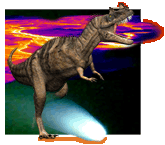More evidence that the Chicxulub impact predates the K/T mass extinction
Type
Yaxcopoil-1 (Yax-1), drilled within the Chicxulub crater, was expected to yield the final proof that this impact occurred precisely 65 Myr ago and caused the mass extinction at the Cretaceous-Tertiary (K/T) boundary. Instead, contrary evidence was discovered based on five independent proxies (sedimentologic, biostratigraphic, magnetostratigraphic, stable isotopic, and iridium) that revealed that the Chicxulub impact predates the K/T boundary by about 300,000 years and could not have caused the mass extinction. This is demonstrated by the presence of five bioturbated glauconite layers and planktic foraminiferal assemblages of the latest Maastrichtian zone CF1 and is corroborated by magnetostratigraphic chron 29r and characteristic late Maastrichtian stable isotope signals. These results were first presented in Keller et al. (2004). In this study, we present more detailed evidence of the presence of late Maastrichtian planktic foraminifera, sedimentologic, and mineralogic analyses that demonstrate that the Chicxulub impact breccia predates the K/T boundary and that the sediments between the breccia and the K/T boundary were deposited in a normal marine environment during the last 300,000 years of the Cretaceous. PDF

